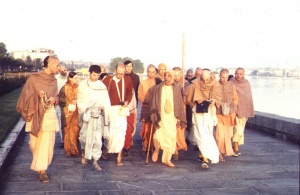SB 5.21.18: Difference between revisions
m (1 revision(s)) |
No edit summary |
||
| Line 1: | Line 1: | ||
{{info | {{info | ||
|speaker= | |speaker=Śukadeva Gosvāmī | ||
|listener=King | |listener=King Parīkṣit | ||
}} | }} | ||
[[Category:Srimad-Bhagavatam - Canto 05 Chapter 21]] | |||
[[Category:Bhagavatam Verses Spoken by Sukadeva Gosvami - Vanisource|052118]] | |||
<div style="float:left">'''[[Srimad-Bhagavatam]] - [[SB 5|Fifth Canto]] - [[SB 5.21: The Movements of the Sun|Chapter 21: The Movements of the Sun]]'''</div> | |||
<div style="float:right">[[File:Go-previous.png|link=SB 5.21.17]] '''[[SB 5.21.17]] - [[SB 5.21.19]]''' [[File:Go-next.png|link=SB 5.21.19]]</div> | |||
{{RandomImage}} | |||
==== TEXT 18 ==== | ==== TEXT 18 ==== | ||
<div | <div class="verse"> | ||
tathānye ca ṛṣayo gandharvāpsaraso nāgā grāmaṇyo yātudhānā devā ity ekaikaśo gaṇāḥ sapta caturdaśa māsi māsi bhagavantaṁ sūryam ātmānaṁ nānā-nāmānaṁ pṛthaṅ-nānā-nāmānaḥ pṛthak-karmabhir dvandvaśa upāsate | :tathānye ca ṛṣayo gandharvāpsaraso nāgā grāmaṇyo | ||
:yātudhānā devā ity ekaikaśo gaṇāḥ sapta caturdaśa | |||
:māsi māsi bhagavantaṁ sūryam ātmānaṁ nānā-nāmānaṁ | |||
:pṛthaṅ-nānā-nāmānaḥ pṛthak-karmabhir dvandvaśa upāsate | |||
</div> | </div> | ||
| Line 13: | Line 22: | ||
==== SYNONYMS ==== | ==== SYNONYMS ==== | ||
<div | <div class="synonyms"> | ||
''tathā''—similarly; ''anye''—others; ''ca''—also; ''ṛṣayaḥ''—saintly persons; ''gandharva-apsarasaḥ''—Gandharvas and Apsarās; ''nāgāḥ''—Nāga snakes; ''grāmaṇyaḥ''—Yakṣas; ''yātudhānāḥ''—Rākṣasas; ''devāḥ''—demigods; ''iti''—thus; ''eka-ekaśaḥ''—one by one; ''gaṇāḥ''—groups; ''sapta''—seven; ''caturdaśa''—fourteen in number; ''māsi māsi''—in every month; ''bhagavantam''—unto the most powerful demigod; ''sūryam''—the sun-god; ''ātmānam''—the life of the universe; ''nānā''—various; ''nāmānam''—who possesses names; ''pṛthak''—separate; ''nānā-nāmānaḥ''—having various names; ''pṛthak''—separate; ''karmabhiḥ''—by ritualistic ceremonies; ''dvandvaśaḥ''—in groups of two; ''upāsate''—worship. | |||
</div> | </div> | ||
| Line 20: | Line 29: | ||
==== TRANSLATION ==== | ==== TRANSLATION ==== | ||
<div | <div class="translation"> | ||
Similarly, fourteen other saints, Gandharvas, Apsarās, Nāgas, Yakṣas, Rākṣasas and demigods, who are divided into groups of two, assume different names every month and continuously perform different ritualistic ceremonies to worship the Supreme Lord as the most powerful demigod Sūryadeva, who holds many names. | Similarly, fourteen other saints, Gandharvas, Apsarās, Nāgas, Yakṣas, Rākṣasas and demigods, who are divided into groups of two, assume different names every month and continuously perform different ritualistic ceremonies to worship the Supreme Lord as the most powerful demigod Sūryadeva, who holds many names. | ||
</div> | </div> | ||
| Line 27: | Line 36: | ||
==== PURPORT ==== | ==== PURPORT ==== | ||
<div | <div class="purport"> | ||
In the Viṣṇu Purāṇa it is said: | In the ''Viṣṇu Purāṇa'' it is said: | ||
:stuvanti munayaḥ sūryaṁ | :''stuvanti munayaḥ sūryaṁ'' | ||
:gandharvair gīyate puraḥ | :''gandharvair gīyate puraḥ'' | ||
:nṛtyanto 'psaraso yānti | :''nṛtyanto 'psaraso yānti'' | ||
:sūryasyānu niśācarāḥ | :''sūryasyānu niśācarāḥ | ||
:vahanti pannagā yakṣaiḥ | '' | ||
:kriyate 'bhiṣusaṅgrahaḥ | :''vahanti pannagā yakṣaiḥ'' | ||
:vālikhilyās tathaivainaṁ | :''kriyate 'bhiṣusaṅgrahaḥ'' | ||
:parivārya samāsate | :''vālikhilyās tathaivainaṁ'' | ||
:so 'yaṁ sapta-gaṇaḥ sūrya- | :''parivārya samāsate'' | ||
:maṇḍale muni-sattama | |||
:himoṣṇa vāri-vṛṣṭīṇāṁ | :''so 'yaṁ sapta-gaṇaḥ sūrya-'' | ||
:hetutve samayaṁ gataḥ | :''maṇḍale muni-sattama'' | ||
:''himoṣṇa vāri-vṛṣṭīṇāṁ'' | |||
:''hetutve samayaṁ gataḥ'' | |||
Worshiping the most powerful demigod Sūrya, the Gandharvas sing in front of him, the Apsarās dance before the chariot, the Niśācaras follow the chariot, the Pannagas decorate the chariot, the Yakṣas guard the chariot, and the saints called the Vālikhilyas surround the sun-god and offer prayers. The seven groups of fourteen associates arrange the proper times for regular snow, heat and rain throughout the universe. | Worshiping the most powerful demigod Sūrya, the Gandharvas sing in front of him, the Apsarās dance before the chariot, the Niśācaras follow the chariot, the Pannagas decorate the chariot, the Yakṣas guard the chariot, and the saints called the Vālikhilyas surround the sun-god and offer prayers. The seven groups of fourteen associates arrange the proper times for regular snow, heat and rain throughout the universe. | ||
</div> | </div> | ||
__NOTOC__ | |||
<div style="float:right; clear:both;">[[File:Go-previous.png|link=SB 5.21.17]] '''[[SB 5.21.17]] - [[SB 5.21.19]]''' [[File:Go-next.png|link=SB 5.21.19]]</div> | |||
__NOTOC__ | |||
__NOEDITSECTION__ | |||
Revision as of 09:59, 1 June 2021

A.C. Bhaktivedanta Swami Prabhupada
TEXT 18
- tathānye ca ṛṣayo gandharvāpsaraso nāgā grāmaṇyo
- yātudhānā devā ity ekaikaśo gaṇāḥ sapta caturdaśa
- māsi māsi bhagavantaṁ sūryam ātmānaṁ nānā-nāmānaṁ
- pṛthaṅ-nānā-nāmānaḥ pṛthak-karmabhir dvandvaśa upāsate
SYNONYMS
tathā—similarly; anye—others; ca—also; ṛṣayaḥ—saintly persons; gandharva-apsarasaḥ—Gandharvas and Apsarās; nāgāḥ—Nāga snakes; grāmaṇyaḥ—Yakṣas; yātudhānāḥ—Rākṣasas; devāḥ—demigods; iti—thus; eka-ekaśaḥ—one by one; gaṇāḥ—groups; sapta—seven; caturdaśa—fourteen in number; māsi māsi—in every month; bhagavantam—unto the most powerful demigod; sūryam—the sun-god; ātmānam—the life of the universe; nānā—various; nāmānam—who possesses names; pṛthak—separate; nānā-nāmānaḥ—having various names; pṛthak—separate; karmabhiḥ—by ritualistic ceremonies; dvandvaśaḥ—in groups of two; upāsate—worship.
TRANSLATION
Similarly, fourteen other saints, Gandharvas, Apsarās, Nāgas, Yakṣas, Rākṣasas and demigods, who are divided into groups of two, assume different names every month and continuously perform different ritualistic ceremonies to worship the Supreme Lord as the most powerful demigod Sūryadeva, who holds many names.
PURPORT
In the Viṣṇu Purāṇa it is said:
- stuvanti munayaḥ sūryaṁ
- gandharvair gīyate puraḥ
- nṛtyanto 'psaraso yānti
- sūryasyānu niśācarāḥ
- vahanti pannagā yakṣaiḥ
- kriyate 'bhiṣusaṅgrahaḥ
- vālikhilyās tathaivainaṁ
- parivārya samāsate
- so 'yaṁ sapta-gaṇaḥ sūrya-
- maṇḍale muni-sattama
- himoṣṇa vāri-vṛṣṭīṇāṁ
- hetutve samayaṁ gataḥ
Worshiping the most powerful demigod Sūrya, the Gandharvas sing in front of him, the Apsarās dance before the chariot, the Niśācaras follow the chariot, the Pannagas decorate the chariot, the Yakṣas guard the chariot, and the saints called the Vālikhilyas surround the sun-god and offer prayers. The seven groups of fourteen associates arrange the proper times for regular snow, heat and rain throughout the universe.